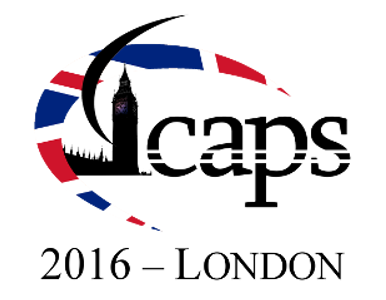Important Dates
- March 18, 2016 (extended)
Paper submission - April 1, 2016
Notification - April 15, 2016
Camera-ready - June 14, 2016
Workshop
Constraint Satisfaction techniques for planning and Scheduling (COPLAS)
The workshop aims at providing a forum to discuss novel issues on planning, scheduling, and constraint satisfaction problems. Solutions to many real-world problems need to integrate plan synthesis capabilities with time and resource allocation, which can be efficiently managed by constraint satisfaction and OR techniques. Formulations of P & S problems as CSPs, resource and temporal global constraints, and inference techniques are of particular interest of COPLAS.
Objectives and Topics
The areas of AI planning and scheduling have seen important advances thanks to the application of constraint satisfaction models and techniques. Especially solutions to many real-world problems need to integrate plan synthesis capabilities with resource allocation, which can be efficiently managed by using constraint satisfaction techniques. The workshop will aim at providing a forum for researchers in the field of Artificial Intelligence to discuss novel issues on planning, scheduling, constraint programming/constraint satisfaction problems (CSPs) and many other common areas that exist among them. On the whole, the workshop will mainly focus on managing complex problems where planning, scheduling and constraint satisfaction must be combined and/or interrelated, which entails an enormous potential for practical applications and future research. COPLAS is ranked as CORE B in ERA Conference Ranking and it is covered in selected Elsevier database products.
We invite submissions on any topic relevant to the workshop, particularly those that combine techniques from both perspectives, planning & scheduling, and constraint programming. This includes but is not limited to:
- Planning (constraint management, temporal planning, multi-criteria planning, planning with resources, reformulations to CSP etc.),
- Scheduling (green scheduling, innovative models, robust solutions, energy efficient scheduling, manufacturing, etc.),
- Integration of planning and scheduling (from a CSP perspective),
- Temporal CSPs.
- Multiobjective planning and scheduling.
- Heuristics and Metaheuristics techniques
- Hybrid CP and OR techniques for P&S.
- Real life applications
We are pleased to accept papers based on recent publications from other (non ICAPS) venues such as specialized conferences (CP, CP-AI-OR, AAMAS, ...), or general AI conferences (AAAI, IJCAI, ECAI, ...). This must be however clearly indicated in the submitted paper. Submission of papers that are under review in another forum such as IJCAI is allowed and encouraged for wider dissemination as COPLAS will have informal proceedings only (but double check the submission conditions of the other conference).
Schedule
Tuesday Afternoon (June 14, 2016)
Important Dates
- Submission deadline: March 18, 2016
- Notification: April 1, 2016
- Final version: April 15, 2016
- Workshop: June 14, 2016
Workshop Program Chairs
- Miguel A. Salido, Universidad Politécnica de Valencia, Spain
msalido@dsic.upv.es - Roman Barták, Charles University in Prague, Czech Republic
bartak@ktiml.mff.cuni.cz
Program Committee
- Federico Barber, Universidad Politecnica de Valencia, Spain
- Roman Barták, Charles University in Prague, Czech Republic
- Minh Binh Do, NASA Ames Research Center, USA
- Agostino Dovier, Universita Degli Studi di Unide, Italy
- Enrico Giunchiglia, Universita di Genova, Italy
- Christophe Guettier, SAGEM, France
- Eva Onaindia, Universidad Politecnica de Valencia, Spain
- Nicola Policella, European Space Agency, Germany
- Enrico Pontelli, New Mexico State University, USA
- Hana Rudová, Masaryk University, Czech Republic
- Miguel A. Salido, Universidad Politecnica Valencia, Spain
- Torsten Schaub, University of Potsdam, Germany
- Dunbing Tang, Nanjing University of Aeronautics & Astronomics, China
- Enrico Pontelli, New Mexico State University, USA
- Ramiro Varela, Universidad de Oviedo, Spain
- Petr Vilím, ILOG/IBM, France
- Neil Yorke-Smith, American University of Beirut/SRI International, USA
